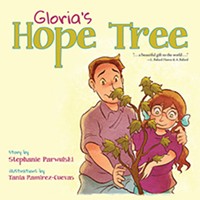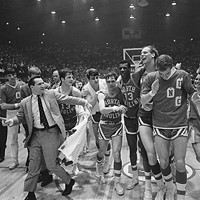The ghosts of their fathers haunt Augusten Burroughs and Rick Bragg.
But that's not all the writers have in common, despite their profound differences. Burroughs and Bragg are both best-selling memoirists whose breakthrough books focused on their difficult childhoods, and particularly their mothers. In Running With Scissors, Burroughs chronicles his dysfunctional family experiences with harrowing anecdotes and deadpan comedy, like The Addams Family updated for the psychotherapeutic excess of the Me Decade. In All Over but the Shoutin', Bragg paid tribute to his mother's struggle to raise her children alone in Appalachian Alabama.
On paper, Burroughs and Bragg sound nothing alike. Burroughs turns his attention inward, excavating memories with a frequently dry sense of irony, not unlike NPR's David Sedaris. Bragg looks to the history of his people and the land, reconstructing the archetypal details of the rural Southern experience in a prose tradition that includes Harper Lee and Eudora Welty.
In one of those flukes of the publishing world, both authors have released memoirs about their fathers at roughly the same time. In their new books, both writers dearly hope that the sins of their fathers will not be visited on them. Burroughs' A Wolf at the Table feels like an attempt to exorcise his father's memory, while Bragg's The Prince of Frogtown seems more like a bid to make peace with his father's spirit.
A Wolf at the Table's chronology makes it nearly a direct prequel to Running with Scissors. Most of the new book takes place up until Burroughs was about 12 years old, roughly when Scissors began. If you read Scissors or saw the Annette Bening film, you'll remember the mental instability of Burroughs' mother, a self-dramatizing poet, and the kookiness of her psychiatrist's family.
A Wolf at the Table shifts our attention to his late father, John G. Robison ("Augusten Burroughs" is a pseudonym). In one of the first scenes, Burroughs recalls traveling with his mother, who tells him that it's "dangerous" for them to be with his father now. A philosophy professor suffering from psoriasis and arthritis, Robison turns a generally normal face to the rest of the world, but behind closed doors proves withdrawn at best, sociopathic at worst. At the height of family tension, he uses the family pets as weapons against his wife and child, and Wolf resembles one of those nightmare childhood novels such as V.C. Andrews' Flowers in the Attic.
Burroughs' humor is nearly absent from Wolf apart from brief glimmers, such as this description of the family dog: "He had his charms, acting as my bodyguard when I played my Arriving at the Oscars! game outside, using the blue wheelbarrow as my limousine." Wolf represents an even deeper feat of creative remembrance than Scissors. Burroughs describes his first memory of being less than 2 years old and looking through one of the little holes on the surface of a Saltine cracker.
Wolf's powerful point of view can also be a limitation. Burroughs acknowledges that one memory of his father alluding to a murder may be a dream. He presents an alarming scene, then reveals it to be an imaginary fake-out. The emotional truth in Burroughs' perception of his father is undeniable, but children's memories aren't always flawless. We grow curious to know how Robison appeared to people outside the household -- whether the mask slipped in public -- but Burroughs never shifts the attention from himself.
Bragg takes an almost opposite approach in The Prince of Frogtown by following his absent father's "offstage" activities during the childhood scenes of All Over But the Shoutin'. Nearly demonized in the earlier book, Charles Bragg emerges here as a tragic figure, if not a wholly sympathetic one. As a young man, he's a brash, charismatic figure, a Casanova on the town square. His feud with a tyrannical sheriff evokes the anti-authority themes of Cool Hand Luke.
Some of Frogtown's most vivid passages describe the financial opportunities and social dislocations of the cotton mill in Jacksonville, Ala., and how the mill worker community becomes a place of near-constant violence. Charles Bragg balks at laboring in the mill or on a farm, but traumatic experience in the Korean War, a painful traffic accident and his increasing dependence on alcohol break his spirit and drive him away from his family responsibilities.
With an ear for oral history and enormous respect for small-town old-timers, Bragg knows how to strike a balance between funny drinkin'-and-fightin' anecdotes and cautionary tales about the pernicious effect of alcoholism. Frogtown alternates between his family's past and Bragg's present-day relationship with his stepson. As the stepfather of a 10-year-old boy, Bragg wonders what kind of dad he'll be. The book's secondary theme turns out to be the simple Tom Sawyer-type pleasures of boyhood, and Bragg's attempts to toughen up his stepson and keep him from becoming a clingy, sheltered child of mass media.
Despite the melancholy portrayal of Charles Bragg's fate and passing Southern folkways, Frogtown ultimately restores your faith in fatherhood, even as Wolf can leave you deeply shaken. Both wounded by their fathers' deeds and inactions, Burroughs and Bragg turn their legacies into literary art. If you read their books side by side, they even come across as spiritual brothers.
A Wolf at the Table: A Memoir of My Father
by Augusten Burroughs
St. Martin's Press, 256 pages, $24.95
The Prince of Frogtown by Rick Bragg
Knopf, 272 pages, $24
Latest in Books
More by Curt Holman
-
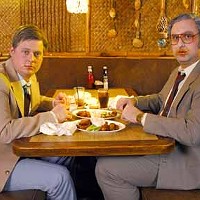
Great job!: How Adult Swim's Tim and Eric got so awesome
Mar 3, 2009 -
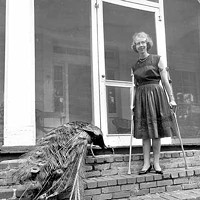
Against the grain: Flannery O'Connor
Mar 3, 2009 -
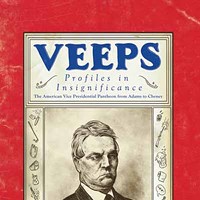
A playful history book: Veeps: Profiles in Insignificance
Jan 6, 2009 - More »
Calendar
-

NEW WINDOW GALLERY-Pat Rhea-ACRYLIC PAINTINGS-April 05-30 2024 VALDESE, NC 28690 @ New Window Gallery/Play It Again Records
- Through April 30, 12 p.m.
-
Derek Hough - Symphony Of Dance @ Ovens Auditorium
-

"Blood Residue Analysis of Paleoamerican Stone Tools in the Carolinas" @ Native American Studies Center
- Fri., April 26, 12-1 p.m.
-

ARTS RENAISSANCE, a GALA supporting the ARTS in South Carolina @ the Columbia Museum of ART
-
 The Piano Guys @ Ovens Auditorium
The Piano Guys @ Ovens Auditorium
-
Charlotte ink 7
Behind the pain with a trio of the Queen City's finest tattoo artists
-
Shaking it up in The Next Room, or The Vibrator Play 1
-
New Documentary Will Showcase Untold Story of Melungeon People 9
From infamy to diversity


